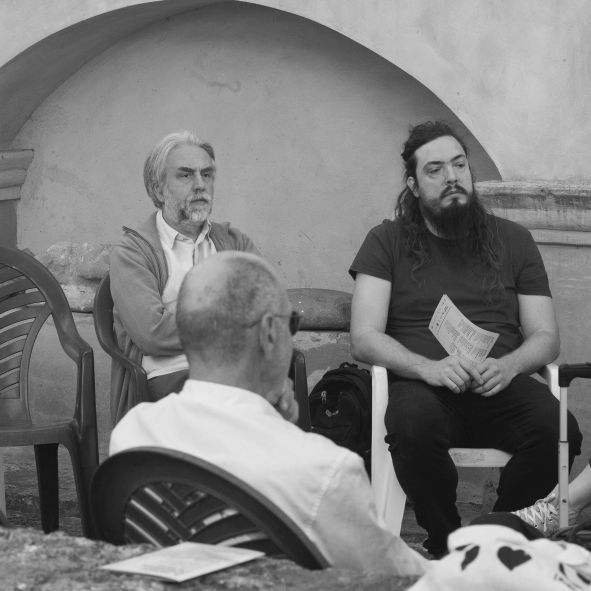Gorazd Kocijančič
Apophatic Philosophy – Beyond phenomenology?
... about Gorazd Kocijančič's philosophical trilogy Razbitje [Being broken apart]
Introduction
The expression apophatic philosophy, which is central to the following case study of a contemporary Slovenian philosopher (how nice it is to read philosophy in one’s mother tongue!), is no novelty in the field of the post-modern critique of metaphysics. It should be taken as the faithful successor to the (still ongoing) turn that took place in French phenomenology and is best expressed in the books Otherwise than Being, or, Beyond Essence by Emmanuel Levinas and God without Being by Jean Luc Marion.1 The best-known spokesman for the apophatic character of philosophical thought in general is the American philosopher William Franke. In his work A Philosophy of the Unsayable from 2014, he set himself the task of posing apophatic thought as the answer to certain key questions in the contemporary philosophy of religion.2 He sought the answer in at the intersections between philosophy, literature and theology, based on classical texts that still speak to contemporary theoretical quandaries concerning attempts to articulate the incomprehensible mysteries of existence. Based on a reading of the apophatic tradition that he conceptualizes as a philosophia perennis, Franke develops an original interpretation which has lately become the center of great interest and further interpretation.3 This means, in fact, that apophatic philosophy is not an obscurum in modern philosophy of religion. But this would be a flawed apology for the title of my paper, as apophatic philosophy actually has traditional roots.
This is why Gorazd Kocijančič (1964), the Slovene philosopher, poet, translator and editor whose .... > read more
about Gorazd Kocijančič
In his Between the East and the West: Four Contributions to the Ecstatics (2004; Italian translation by. D. Hlede in G. Kocijančič/G. Grandi: Oriente e Occidente, 2004) he formulated his understanding of the relationship between different spiritual traditions and the metaontology, gnoseology, ethics and ecclesiology of the supraconfessional, >Eastern-Western< Christianity.
The volume To Those Outside: Exoteric Writings 1990-2003 (2004) brings together short newspaper articles, columns and book reviews published in various journals and newspapers, in which he comments on current events, newly published books and artistic events from the perspective of his >anarchic< philosophy of culture.
He has written upon and translated from Ancient Greek a Pre-Socratic verse composition by the poet-thinker Parmenides (Parmenides: Fragments 1995) and translated into Slovene The Elements of Theology by Proclus (1999). He translated (and commented upon) complete works of Plato (Celje: 2004) and edited Slovene translations of the complete Diels-Kranz collections of Presocratic fragments. He has also worked on the New standard translation of the Bible into Slovene (by providing translation of and commentary to the Gospels and certain deuterocanonical books of Old Testament and the revision of the entire New Testament), and translated and annotated numerous patristic works (Thoughts of the Greek Fathers on Prayer, 1993; The Wisdom of the Desert, 1994; Apostolic Fathers, 1996; Gregory of Nyssa: Life of Macrina, Dialogue On the Soul and Resurrection, 1996; Logos in Defence of the Truth: Selected Writings by the Early Christian Apologists, 1998; Maximus the Confessor: Selected Works, 2000, What is Christianity? 2016). His last work is translation of the complete works of Dionysius the Areopagite(2009) and Boethius’ Consolation of Philosophy (2012).
He also edited and translated with others Meister Eckhart's Sermons and Treatises in 1996 and edited the translation of a
series of books on history of medieval philosophy (V. Tatakis, H. Corbin, G. Vajda, 2001). His other interests include nineteenth-century thought (he translated V. Solovyov's Spiritual foundations of life, 2000, and provided an introduction to it with the title >The Subject and the Doctrine<) and contemporary currents of philosophical thought (he translated E. Lévinas: Time and the Other, 1998, and wrote an introduction to it with the title >Other time? Different Other? Phenomenology as a hermeneutical problem<).
His collection of poetry >Your names< (2000) was published bilingualy, with an English translation; his other four collections are Trideset stopnic in naju ni <Thirty steps and we’re gone> (2005), Certamen spirituale (2008), Primož Trubar is leaving Ljubljana (2011) and From Thales to yourself. A History of European philosophy in verses (2019). Many of his poems are translated in various languages and included in anthologies of Slovene poetry.
Besides translating philosophical and theological
Texts and writing poetry, he has also been involved in literary translation: from Hebrew he has translated a selection of poems by the most renowned Hebrew poets of the Middle Ages (Judah ben Samuel Halevi: Selected Poems, 1998, Solomon ibn Gabirol, Crown of the Kingdom, 2011), from German he has translated Rilke (Marienleben and Stundenbuch) and with Vid Snoj poems by Angelus Silesius and Paul Celan, from French Paul Claudel (Cent phrases pour l’eventail) and Charles Peguy and edited and translated an anthology of Greek Christian poetry (Athos - The Dividing Line Between Heaven and the Earth).
In 1997 he edited the journal Tretji dan and contributed to it until 2000, he was also an editor of its book collection; later he founded the international multilingual electronic journal for culture and spirituality Logos (www.kud-logos.si) where he is was the editor of the journal and its book collection from 2001 to 2021.
Currently he is working on his own philosophical system: introduction in the first, ontological part, was published in 2009 under title Being thorn apart- Seven radical essays, the second in 2011 (Erotics, politics etc. Three essays on the soul, 2011), the third in 2016 (On various others. Essays on animals, dreams, language and nothingness). All three books are available also in Serbian translation.


































































